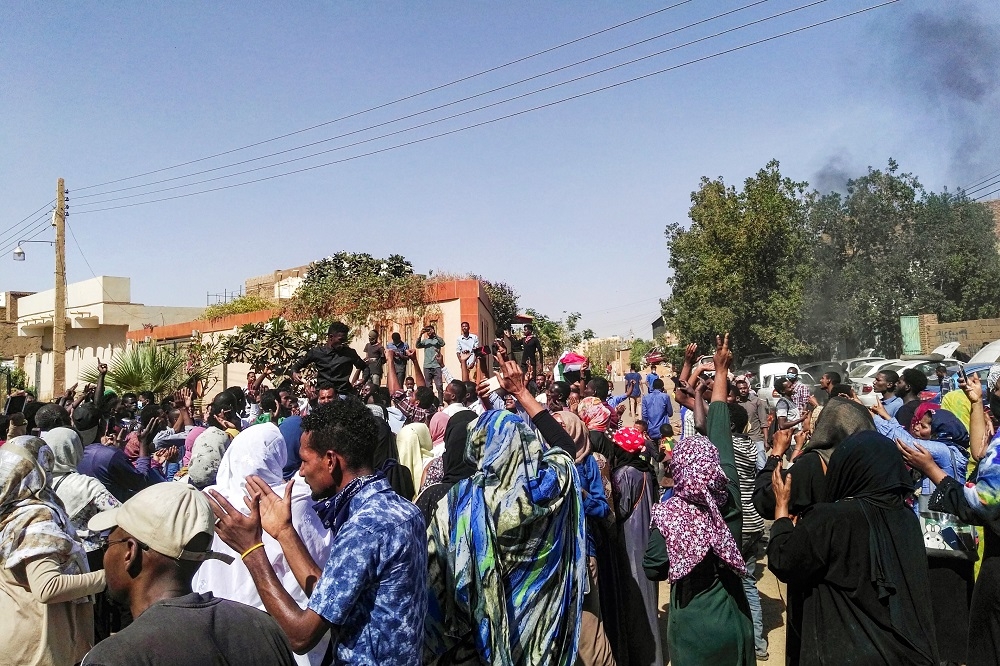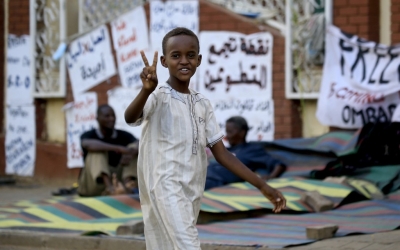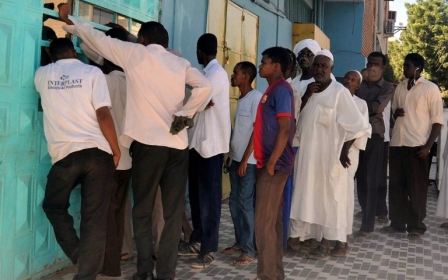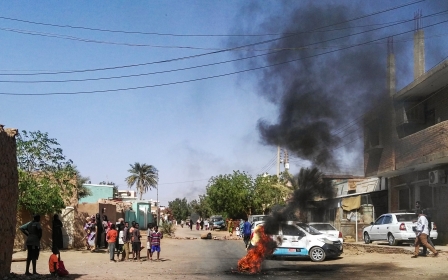Sudan emergency court sentences three protesters to six months in jail: Lawyer

An emergency court in Sudan has sentenced three protesters to six months in prison for taking part in an anti-government rally, as demonstrations continue against President Omar al-Bashir's rule.
The three protesters, who include two female university students, were sentenced on Wednesday by an emergency court in Omdurman, the Sudanese capital Khartoum's twin city, their lawyer told AFP.
Lawyer Enaam Atieg told the news agency that the female students were arrested earlier in the day for taking part in a protest in Omdurman.
"We will file an appeal for the three protesters tomorrow," Atieg said.
Why are Sudanese protesting against their government?
+ Show - HideSudanese protests have evolved in the space of less than six months from complaints about bread prices to calls for long-term leader Omar al-Bashir to go and demands for a civilian-led transition to democracy.
Here's a summary of the key moments so far since the protests began.
19 December 2018: People take to the streets in the city of Atbara to protest against a government decision to triple the price of bread, torching a local ruling party office. By the next day protesters on the streets of Khartoum and other cities calling for "freedom, peace, justice". Police try to disperse the crowds, resulting in at least eight deaths. Dozens more will be killed in the weeks of protest that follow
22 February 2019: Sudanese President Omar al-Bashir declares a nationwide state of emergency. He swears in a new prime minister two days later, as riot police confront hundreds of protesters calling for him to resign
6 April: Thousands gather outside the army's headquarters in Khartoum, chanting "one army, one people" in a plea for the military's support. They defy attempts by state security forces to dislodge them and troops intervene to protect them
11 April: Military authorities announce they have removed Bashir and that a transitional military council will govern for two years. Despite celebrations at Bashir's demise, protest leaders denounce the move as a "coup" and the protesters remain camped outside army headquarters.
14 April: Protest leaders call on the military council to transfer power to a civilian government
20 April: Sudan's military rulers hold a first round of talks with protest leaders
27 April: The two sides agree to establish a joint civilian-military ruling council, but talks stall over differences in the composition of the council, with both sides demanding a a majority
15 May: With negotiators reported to be close to agreeing a three-year transition to civilian rule, military leaders suspend talks and insist protesters remove barricades outside the army's headquarters. Talks resume on 19 May but break down again on 20 May, with the opposition insistent that a civilian must head the transitional governing body
28 May: Thousands of workers begin a two-day strike to pressure the military rulers and call for civilian government
3 June: At least 35 people killed and hundreds injured, according to opposition-aligned doctors, as security forces firing live ammunition move to disperse the protest camp outside army headquarters
4 June: General Abdel Fattah al-Burhan, the head of the military council, announces that all previous agreements with protest leaders are scrapped and says elections will be held in nine months
Protests have taken place across Sudan since 19 December.
New MEE newsletter: Jerusalem Dispatch
Sign up to get the latest insights and analysis on Israel-Palestine, alongside Turkey Unpacked and other MEE newsletters
While they first erupted as a result of public anger over a rise in living costs, the mass rallies have since morphed into a nationwide call for Bashir to resign.
The Sudanese president triggered a state of emergency in response, putting a set of restrictions in place across the country in a bid to stem the unrest, including a ban on unauthorised protests.
Bashir also established special courts to investigate alleged violations of the state of emergency.
Still, the rallies have continued in defiance of the emergency as the protesters have rejected the government's efforts to stymie their demands.
Scores tried in emergency courts
The Democratic Lawyers Alliance, a legal group that is part of the protest movement, confirmed the sentencing against the protesters on Wednesday, AFP reported.
The group slammed the court's decision as an "aggressive punishment".
Groups of protesters had staged a rally in Omdurman earlier in the day, but they were quickly dispersed by riot police, witnesses told AFP.
Scores of anti-government protesters have been tried in emergency courts since they were established. Some of the demonstrators have been sentenced to between six months and five years in prison.
In early March, a Sudanese appeals court threw out sentences handed down to eight anti-government protesters.
Opposition activists and their relatives who are being tried have accused Bashir of using emergency laws and special courts to put pressure on those involved in the protest movement.
The state of emergency was initially set to last for one year, but the Sudanese president later reduced it to six months.
Officials say 31 people have died in protest-related violence since December, but Human Rights Watch has put the death toll at 51, including children and medics.
Middle East Eye delivers independent and unrivalled coverage and analysis of the Middle East, North Africa and beyond. To learn more about republishing this content and the associated fees, please fill out this form. More about MEE can be found here.





